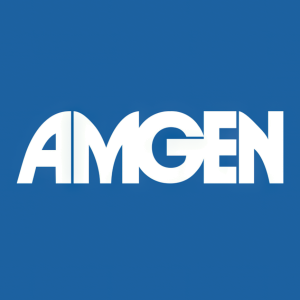FDA GRANTS FULL APPROVAL TO AMGEN'S IMDELLTRA® IN EXTENSIVE STAGE SMALL CELL LUNG CANCER
Rhea-AI Summary
Amgen (NASDAQ: AMGN) announced that the FDA granted full approval to IMDELLTRA (tarlatamab-dlle) on Nov 19, 2025 for adult patients with extensive stage small cell lung cancer (ES-SCLC) with progression after platinum-based chemotherapy. The decision converts prior accelerated approval based on the global Phase 3 DeLLphi-304 trial, which showed a 40% reduction in risk of death versus standard chemotherapy (median overall survival 13.6 vs. 8.3 months; HR 0.60; P < 0.001).
The NCCN Guidelines were updated to list tarlatamab as the only Category 1 preferred option in this setting. Safety in DeLLphi-304 was consistent with known profile: fewer Grade ≥3 adverse events versus chemotherapy (54% vs. 80%); common IMDELLTRA toxicities included neutropenia (4%), lymphopenia (4%), and primarily low-grade cytokine release syndrome.
Positive
- Overall survival improved: median OS 13.6 vs 8.3 months
- Mortality risk reduced by 40% (HR 0.60) in DeLLphi-304
- NCCN updated to Category 1 preferred treatment for ES-SCLC
- Fewer Grade ≥3 adverse events with IMDELLTRA: 54% vs 80%
Negative
- Grade ≥3 treatment-related adverse events still occurred in 54% of IMDELLTRA patients
- Hematologic TRAEs with IMDELLTRA included neutropenia 4% and lymphopenia 4%
- Cytokine release syndrome occurred in 56% (42% Grade 1; 13% Grade 2; 1% Grade 3) of patients
News Market Reaction
On the day this news was published, AMGN declined 1.85%, reflecting a mild negative market reaction.
Data tracked by StockTitan Argus on the day of publication.
Global Confirmatory Phase 3 DeLLphi-304 Trial Showed IMDELLTRA Reduced Risk of Death by
Underscores IMDELLTRA as a Recognized Standard of Care Treatment for Patients With Extensive Stage Small Cell Lung Cancer That Has Progressed
The global Phase 3 DeLLphi-304 study met its primary endpoint, demonstrating that IMDELLTRA reduced the risk of death by
"The FDA's decision reinforces IMDELLTRA as a recognized standard of care for people living with extensive stage small cell lung cancer whose disease progressed on or after frontline therapy," said Jay Bradner, M.D., executive vice president, Research and Development, at Amgen. "We are committed to delivering transformative medicines for patients facing challenging cancers, and we are currently focused on rapidly developing IMDELLTRA in earlier stages of disease and earlier lines of therapy for small cell lung cancer patients."
"For far too long, people living with small cell lung cancer had few options once their first treatment stopped working," said Laurie Fenton Ambrose, co-founder, president, and CEO, GO2 for Lung Cancer. "Today's full approval is an important step forward, reinforcing long-awaited progress for patients facing this devastating disease."
The safety profile for IMDELLTRA in DeLLphi-304 was consistent with its known profile, with fewer Grade 3 or greater adverse events in the IMDELLTRA arm than in the chemotherapy arm (
"Due to its distinctive biology and aggressive nature, small cell lung cancer has long been particularly challenging to treat, with limited progress compared to many other cancers. After years of research efforts, DeLLphi-304 was the first global Phase 3 trial to demonstrate a significant survival benefit over chemotherapy in its setting, leading to NCCN Guidelines® Category 1 status for tarlatamab and further demonstrating the validity of this treatment approach in small cell lung cancer," said Charles M. Rudin, M.D., Ph.D., deputy director, Memorial Sloan Kettering Cancer Center, and principal investigator.* "Importantly, data from DeLLphi-304 reflected in today's approval also equip physicians with a greater understanding of managing treatment with bispecific T-cell engager therapy."
Amgen's robust IMDELLTRA development program includes the DeLLphi clinical trials, which evaluate IMDELLTRA as a monotherapy and as part of combination regimens, including in both earlier stages of SCLC and earlier lines of treatment.
About the Phase 3 DeLLphi-304 Study
DeLLphi-304 is a global Phase 3, randomized, controlled, open-label clinical trial evaluating the efficacy and safety of IMDELLTRA as a treatment for patients living with SCLC who progressed on or after a single line of platinum-based chemotherapy.3 Five hundred and nine patients were randomized to receive either IMDELLTRA or local SOC chemotherapy (topotecan in all countries except
About Tarlatamab Clinical Trials
Tarlatamab is being investigated in multiple studies including DeLLphi-303, a Phase 1b study investigating tarlatamab in combination with SOC therapies in first-line ES-SCLC; DeLLphi-304, a randomized Phase 3 study comparing tarlatamab monotherapy with SOC chemotherapy in second-line treatment of SCLC; DeLLphi-305, a randomized Phase 3 study comparing tarlatamab in combination with durvalumab vs. durvalumab alone as first-line maintenance treatment in ES-SCLC; DeLLphi-306, a randomized placebo-controlled Phase 3 study of tarlatamab following concurrent chemoradiotherapy in limited-stage SCLC; DeLLphi-308, a Phase 1b study evaluating subcutaneous tarlatamab in second-line or later ES-SCLC; DeLLphi-309, a Phase 2 study evaluating alternative intravenous dosing regimens with tarlatamab in second-line ES-SCLC; DeLLphi-310, a Phase 1b study of tarlatamab in combination with YL201 with or without anti-programmed death ligand 1 (PD-L1) in patients with ES-SCLC; DeLLphi-311, a Phase 1b study of IMDELLTRA in combination with etakafusp alfa (AB248), a novel CD8+ T-cell selective interleukin-2 (IL-2), in patients with ES-SCLC; and DeLLphi-312, a Phase 3 study evaluating tarlatamab as an induction and maintenance therapy in first-line treatment of ES-SCLC in combination with carboplatin, etoposide and durvalumab.6
For more information, please visit www.tarlatamabclinicaltrials.com.
About Small Cell Lung Cancer (SCLC)
SCLC is one of the most aggressive and devastating forms of solid tumor cancers. In
About IMDELLTRA® (tarlatamab-dlle)
IMDELLTRA is a first-in-class targeted immunotherapy engineered by Amgen researchers to bind to both DLL3 on tumor cells and CD3 on T cells, thereby activating T cells to kill DLL3-expressing SCLC cells. This results in the formation of a cytolytic synapse with lysis of the cancer cell.11,12 DLL3 is a protein that is expressed on the surface of SCLC cells in ~85
INDICATION
IMDELLTRA® (tarlatamab-dlle) is indicated for the treatment of adult patients with extensive stage small cell lung cancer (ES-SCLC) with disease progression on or after platinum-based chemotherapy.
IMPORTANT SAFETY INFORMATION
WARNING: CYTOKINE RELEASE SYNDROME and NEUROLOGIC TOXICITY including IMMUNE EFFECTOR CELL-ASSOCIATED NEUROTOXICITY SYNDROME
- Cytokine release syndrome (CRS), including life-threatening or fatal reactions, can occur in patients receiving IMDELLTRA®. Initiate treatment with IMDELLTRA® using the step-up dosing schedule to reduce the incidence and severity of CRS. Withhold IMDELLTRA® until CRS resolves or permanently discontinue based on severity.
- Neurologic toxicity and immune effector cell-associated neurotoxicity syndrome (ICANS), including life-threatening or fatal reactions, can occur in patients receiving IMDELLTRA®. Monitor patients for signs and symptoms of neurologic toxicity, including ICANS, during treatment and treat promptly. Withhold IMDELLTRA® until ICANS resolves or permanently discontinue based on severity.
WARNINGS AND PRECAUTIONS
-
Cytokine Release Syndrome (CRS): IMDELLTRA® can cause CRS including life-threatening or fatal reactions. In the pooled safety population, CRS occurred in
57% (268/473) of patients who received IMDELLTRA®, including39% Grade 1,15% Grade 2,1.7% Grade 3 and0.2% Grade 4. Recurrent CRS occurred in24% of IMDELLTRA®-treated patients including20% Grade 1 and3.4% Grade 2; one patient experienced recurrent Grade 3.
Among the 268 patients who experienced CRS,73% had CRS after the first dose,60% had CRS after the second dose, and15% had CRS following the third or later dose. Following the Cycle 1 Day 1, Day 8, Day 15 infusions,24% ,8% , and1% of patients experienced Grade ≥ 2 CRS, respectively. From Cycle 2 onwards,1.5% of patients experienced Grade ≥ 2 CRS. Of the patients who experienced CRS,31% received steroids and10% required tocilizumab. The median time to onset of all grade CRS from most recent dose of IMDELLTRA® was 16 hours (range: start of infusion to 15 days). The median time to onset of Grade ≥ 2 CRS from most recent dose of IMDELLTRA® was 15 hours (range: start of infusion to 15 days).
Clinical signs and symptoms of CRS included pyrexia, hypotension, fatigue, tachycardia, headache, hypoxia, nausea, and vomiting. Potentially life-threatening complications of CRS may include cardiac dysfunction, acute respiratory distress syndrome, neurologic toxicity, renal and/or hepatic failure, and disseminated intravascular coagulation (DIC).
Administer IMDELLTRA® following the recommended step-up dosing and administer concomitant medications before and after Cycle 1 Day 1 and Cycle 1 Day 8 IMDELLTRA® infusions as described in Table 3 of the Prescribing Information (PI) to reduce the risk of CRS. Administer IMDELLTRA® in an appropriate healthcare facility equipped to monitor and manage CRS. Ensure patients are well hydrated prior to administration of IMDELLTRA®.
Closely monitor patients for signs and symptoms of CRS during treatment with IMDELLTRA®. At the first sign of CRS, immediately discontinue IMDELLTRA® infusion, evaluate the patient for hospitalization and institute supportive care based on severity. Withhold or permanently discontinue IMDELLTRA® based on severity. Counsel patients and caregivers to seek medical attention should signs or symptoms of CRS occur. -
Neurologic Toxicity, Including ICANS: IMDELLTRA® can cause life-threatening or fatal neurologic toxicity, including ICANS. In the pooled safety population, neurologic toxicity occurred in
65% of patients who received IMDELLTRA®, with Grade 3 or higher events in7% of patients including fatal events in0.2% . The most frequent neurologic toxicities were dysgeusia (34% ), headache (17% ), peripheral neuropathy (9% ), dizziness (9% ), and insomnia (8% ). The incidence of signs and symptoms consistent with ICANS was10% in IMDELLTRA®-treated patients including events with the preferred terms: ICANS (4.7% ), muscular weakness (3.2% ), cognitive disorder (0.6% ), aphasia (0.6% ), depressed level of consciousness (0.4% ), seizures (0.4% ), encephalopathy (0.4% ), and leukoencephalopathy (0.2% ). There was one fatal reaction of ICANS. Recurrent ICANS occurred in1.5% of patients. Of the patients who experienced ICANS, most experienced the event following Cycle 1 Day 1 (2.5% ) and Cycle 1 Day 8 (3.6% ). Following Day 1, Day 8, and Day 15 infusions,1.3% ,1.3% and0.4% of patients experienced Grade ≥ 2 ICANS, respectively. ICANS can occur several weeks following administration of IMDELLTRA®. The median time to onset of ICANS from the first dose of IMDELLTRA® was 16 days (range: 1 to 862 days). The median time to resolution of ICANS was 4 days (range: 1 to 40 days).
The onset of ICANS can be concurrent with CRS, following resolution of CRS, or in the absence of CRS. Clinical signs and symptoms of ICANS may include but are not limited to confusional state, depressed level of consciousness, disorientation, somnolence, lethargy, and bradyphrenia.
Patients receiving IMDELLTRA® are at risk of neurologic adverse reactions and ICANS resulting in depressed level of consciousness. Advise patients to refrain from driving and engaging in hazardous occupations or activities, such as operating heavy or potentially dangerous machinery, until neurologic symptoms resolve.
Closely monitor patients for signs and symptoms of neurologic toxicity and ICANS during treatment with IMDELLTRA®. At the first sign of ICANS, immediately discontinue the infusion, evaluate the patient and provide supportive therapy based on severity. Withhold IMDELLTRA® or permanently discontinue based on severity.
Cytopenias: IMDELLTRA® can cause cytopenias including neutropenia, thrombocytopenia, and anemia. In the pooled safety population, based on laboratory data, decreased neutrophils occurred in16% of patients, including9% Grade 3 or 4. The median time to onset for Grade 3 or 4 decreased neutrophil count was 41 days (range: 2 to 306 days). Decreased platelets occurred in30% including2.2% Grade 3 or 4. The median time to onset for Grade 3 or 4 decreased platelets was 67 days (range: 3 to 420 days). Decreased hemoglobin occurred in56% of patients, including4.7% Grade 3 or 4. Febrile neutropenia was reported as an adverse event in1.5% of patients treated with IMDELLTRA®.
Monitor patients for signs and symptoms of cytopenias. Perform complete blood counts prior to treatment with all doses of IMDELLTRA®, up through Cycle 5 Day 15 and then prior to administration on Day 1 of each cycle starting with Cycle 6. Based on the severity of cytopenias, temporarily withhold, or permanently discontinue IMDELLTRA®. -
Infections: IMDELLTRA® can cause serious infections, including life-threatening and fatal infections.
In the pooled safety population, infections, including opportunistic infections, occurred in43% of patients who received IMDELLTRA®, including14% Grade 3 or 4. The most frequent infections were pneumonia (11% ), urinary tract infection (9% ), COVID-19 (6% ), upper respiratory tract infection (4.7% ), respiratory tract infection (4% ), candida infection (2.1% ), oral candidiasis (2.1% ), and nasopharyngitis (2.1% ).
Monitor patients for signs and symptoms of infection prior to and during treatment with IMDELLTRA® and treat as clinically indicated. Withhold or permanently discontinue IMDELLTRA® based on severity. -
Hepatotoxicity: IMDELLTRA® can cause hepatotoxicity. In the pooled safety population, based on laboratory data, elevated ALT occurred in
39% of patients who received IMDELLTRA®, including2.5% with Grade 3 or 4 ALT. Elevated AST occurred in43% of patients, including3.2% Grade 3 or 4. Elevated bilirubin also occurred in16% of patients, including1.3% Grade 3 or 4. Liver enzyme elevation can occur with or without concurrent CRS.
Monitor liver enzymes and bilirubin prior to treatment with IMDELLTRA®, and as clinically indicated. Withhold IMDELLTRA® or permanently discontinue based on severity. -
Hypersensitivity: IMDELLTRA® can cause severe hypersensitivity reactions. Clinical signs and symptoms of hypersensitivity may include, but are not limited to, rash and bronchospasm. Monitor patients for signs and symptoms of hypersensitivity during treatment with IMDELLTRA® and manage as clinically indicated. Withhold or consider permanent discontinuation of IMDELLTRA® based on severity.
- Embryo-Fetal Toxicity: Based on its mechanism of action, IMDELLTRA® may cause fetal harm when administered to a pregnant woman. Advise patients of the potential risk to a fetus. Advise females of reproductive potential to use effective contraception during treatment with IMDELLTRA® and for 2 months after the last dose.
ADVERSE REACTIONS
- The pooled safety population reflects exposure to intravenous IMDELLTRA®, as a single agent, at the recommended dosage of IMDELLTRA® 1 mg on Cycle 1 Day 1 followed by 10 mg on Days 8 and 15, and then every 2 weeks until disease progression or intolerable toxicity in 473 patients with small cell lung cancer enrolled in three clinical trials: DeLLphi-300, DeLLphi-301 and DeLLphi-304. Among 473 patients who received IMDELLTRA®,
40% were exposed for 6 months or longer and19% were exposed for greater than one year. - The most common (≥
20% ) adverse reactions were CRS (57% ), fatigue (48% ), decreased appetite (38% ), dysgeusia (34% ), pyrexia (33% ), constipation (31% ), musculoskeletal pain (31% ), and nausea (25% ). - The most common (≥
5% ) Grade 3 or 4 laboratory abnormalities were decreased lymphocytes (43% ), decreased sodium (12% ), decreased total neutrophils (9% ), and increased uric acid (6% ).
DOSAGE AND ADMINISTRATION: Important Dosing Information
- Administer IMDELLTRA® as an intravenous infusion over 1 hour.
- Administer IMDELLTRA® according to the step-up dose and schedule in the IMDELLTRA® PI (Table 1) to reduce the incidence and severity of CRS.
- Evaluate complete blood count, liver enzymes and bilirubin prior to administration of all doses of IMDELLTRA® up through Cycle 5 Day 15 and then prior to administration of IMDELLTRA® on Day 1 of each cycle starting with Cycle 6. More frequent evaluation may be necessary if clinically indicated.
- For Cycle 1, administer recommended concomitant medications before and after Cycle 1 Day 1 and Cycle 1 Day 8 IMDELLTRA® infusions to reduce the risk of CRS reactions as described in the PI (Table 3).
- IMDELLTRA® should only be administered by a qualified healthcare professional with appropriate medical support to manage severe reactions such as CRS and neurologic toxicity including ICANS.
- Due to the risk of CRS and neurologic toxicity, including ICANS, monitor patients from the start of the IMDELLTRA® infusion for 22 to 24 hours following Cycle 1 Day 1 and Cycle 1 Day 8 in an appropriate healthcare setting.
- Recommend that patients remain within 1 hour of an appropriate healthcare setting for a total of 48 hours from the start of the infusion with IMDELLTRA® following Cycle 1 Day 1 and Cycle 1 Day 8 doses, accompanied by a caregiver.
- Inform both the patient and the caregiver on the signs and symptoms of CRS and ICANS prior to discharge.
- Ensure patients are well hydrated prior to administration of IMDELLTRA®.
Please see IMDELLTRA® full Prescribing Information , including BOXED WARNINGS.
About Amgen
Amgen discovers, develops, manufactures and delivers innovative medicines to help millions of patients in their fight against some of the world's toughest diseases. More than 40 years ago, Amgen helped to establish the biotechnology industry and remains on the cutting-edge of innovation, using technology and human genetic data to push beyond what's known today. Amgen is advancing a broad and deep pipeline that builds on its existing portfolio of medicines to treat cancer, heart disease, osteoporosis, inflammatory diseases and rare diseases.
In 2024, Amgen was named one of the "World's Most Innovative Companies" by Fast Company and one of "America's Best Large Employers" by Forbes, among other external recognitions. Amgen is one of the 30 companies that comprise the Dow Jones Industrial Average®, and it is also part of the Nasdaq-100 Index®, which includes the largest and most innovative non-financial companies listed on the Nasdaq Stock Market based on market capitalization.
For more information, visit Amgen.com and follow Amgen on X, LinkedIn, Instagram, YouTube, and Threads.
Forward-Looking Statements
This news release contains forward-looking statements that are based on the current expectations and beliefs of Amgen. All statements, other than statements of historical fact, are statements that could be deemed forward-looking statements, including any statements on the outcome, benefits and synergies of collaborations, or potential collaborations, with any other company (including BeOne Medicines Ltd. or Kyowa Kirin Co., Ltd.), the performance of Otezla® (apremilast), our acquisitions of ChemoCentryx, Inc. or Horizon Therapeutics plc (including the prospective performance and outlook of Horizon's business, performance and opportunities, and any potential strategic benefits, synergies or opportunities expected as a result of such acquisition), as well as estimates of revenues, operating margins, capital expenditures, cash, other financial metrics, expected legal, arbitration, political, regulatory or clinical results or practices, customer and prescriber patterns or practices, reimbursement activities and outcomes, effects of pandemics or other widespread health problems on our business, outcomes, progress, and other such estimates and results. Forward-looking statements involve significant risks and uncertainties, including those discussed below and more fully described in the Securities and Exchange Commission reports filed by Amgen, including our most recent annual report on Form 10-K and any subsequent periodic reports on Form 10-Q and current reports on Form 8-K. Unless otherwise noted, Amgen is providing this information as of the date of this news release and does not undertake any obligation to update any forward-looking statements contained in this document as a result of new information, future events or otherwise.
No forward-looking statement can be guaranteed and actual results may differ materially from those we project. Our results may be affected by our ability to successfully market both new and existing products domestically and internationally, clinical and regulatory developments involving current and future products, sales growth of recently launched products, competition from other products including biosimilars, difficulties or delays in manufacturing our products and global economic conditions, including those resulting from geopolitical relations and government actions. In addition, sales of our products are affected by pricing pressure, political and public scrutiny and reimbursement policies imposed by third-party payers, including governments, private insurance plans and managed care providers and may be affected by regulatory, clinical and guideline developments and domestic and international trends toward managed care and healthcare cost containment. Furthermore, our research, testing, pricing, marketing and other operations are subject to extensive regulation by domestic and foreign government regulatory authorities. We or others could identify safety, side effects or manufacturing problems with our products, including our devices, after they are on the market. Our business may be impacted by government investigations, litigation and product liability claims. In addition, our business may be impacted by the adoption of new tax legislation or exposure to additional tax liabilities. Further, while we routinely obtain patents for our products and technology, the protection offered by our patents and patent applications may be challenged, invalidated or circumvented by our competitors, or we may fail to prevail in present and future intellectual property litigation. We perform a substantial amount of our commercial manufacturing activities at a few key facilities, including in
CONTACT: Amgen, Thousand Oaks
Annik Allen, 917-288-9136 (media)
Elissa Snook, 609-251-1407 (media)
Casey Capparelli, 805-447-1746 (investors)
*NCCN Disclaimer: NCCN makes no warranties of any kind whatsoever regarding their content, use or application and disclaims any responsibility for their application or use in any way.
REFERENCES
- National Comprehensive Cancer Network. NCCN Clinical Practice Guidelines in Oncology: Small Cell Lung Cancer. Version 2.2026. Accessed September 16, 2025. https://www.nccn.org/professionals/physician_gls/pdf/sclc.pdf.
- Mountzios G, Sun L, Cho BC, et al. Tarlatamab in small-cell lung cancer after platinum-based chemotherapy. N Engl J Med. 2025;393(4):349-361. doi:10.1056/NEJMoa2502099.
- DeLLphi-304 clinical trial listing. ClinicalTrials.gov. Accessed September 5, 2025. https://www.clinicaltrials.gov/study/NCT05740566.
- Paz-Ares L, Felip E, Ahn MJ, et al. Randomized phase 3 study of tarlatamab, a DLL3-targeting bispecific T-cell engager (BiTE), compared to standard of care in patients with relapsed small cell lung cancer (DeLLphi-304). J Clin Oncol. 2023;41(suppl 16):TPS8611. doi:10.1200/JCO.2023.41.16_suppl.TPS8611.
- Rudin CM, Mountzios GS, Sun L, et al. Tarlatamab versus chemotherapy (CTx) as second-line (2L) treatment for small-cell lung cancer: primary analysis of Ph3 DeLLphi-304. Oral presentation at: ASCO Annual Meeting; May 30–June 2, 2025;
Chicago, IL. Abstract LBA8008. - ClinicalTrials.gov. Tarlatamab Clinical Trial Listings.
Bethesda, MD : US National Library of Medicine; 2025. Accessed September 5, 2025. https://www.clinicaltrials.gov. - PDQ® Adult Treatment Editorial Board. PDQ Small Cell Lung Cancer Treatment.
Bethesda, MD : National Cancer Institute; 2025. Updated May 14, 2025. Accessed September 5, 2025. https://www.cancer.gov/types/lung/hp/small-cell-lung-treatment-pdq. - International Agency for Research on Cancer. Trachea, Bronchus, and Lung Cancer Fact Sheet. GLOBOCAN; 2022. https://gco.iarc.who.int/media/globocan/factsheets/cancers/15-trachea-bronchus-and-lung-fact-sheet.pdf.
- Oronsky B, Abrouk N, Caroen S, et al. A 2022 update on extensive stage small-cell lung cancer (SCLC). J Cancer. 2022;13(9):2945-2953. doi:10.7150/jca.75622.
- Sabari JK, Lok BH, Laird JH, Poirier JT, Rudin CM. Unravelling the biology of SCLC: implications for therapy. Nat Rev Clin Oncol. 2017;14(9):549-561. doi:10.1038/nrclinonc.2017.71.
- Giffin MJ, Cooke K, Lobenhofer EK, et al. AMG 757, a half-life extended, DLL3-targeted bispecific T-cell engager, shows high potency and sensitivity in preclinical models of small-cell lung cancer. Clin Cancer Res. 2021;27(6):1526-1537.
- Baeuerle PA, Kufer P, Bargou R. BiTE: teaching antibodies to engage T cells for cancer therapy. Curr Opin Mol Ther. 2009;11(1):22-30.
- Ahn MJ, Cho BC, Felip E, et al. Tarlatamab for patients with previously treated small cell lung cancer. N Engl J Med. 2023;389(22):2063-2075. doi:10.1056/NEJMoa2307980.
- Rojo F, Corassa M, Mavroudis D, et al. International real-world study of DLL3 expression in patients with small cell lung cancer. Lung Cancer. 2020;147:237-243.
![]() View original content to download multimedia:https://www.prnewswire.com/news-releases/fda-grants-full-approval-to-amgens-imdelltra-in-extensive-stage-small-cell-lung-cancer-302620865.html
View original content to download multimedia:https://www.prnewswire.com/news-releases/fda-grants-full-approval-to-amgens-imdelltra-in-extensive-stage-small-cell-lung-cancer-302620865.html
SOURCE Amgen








